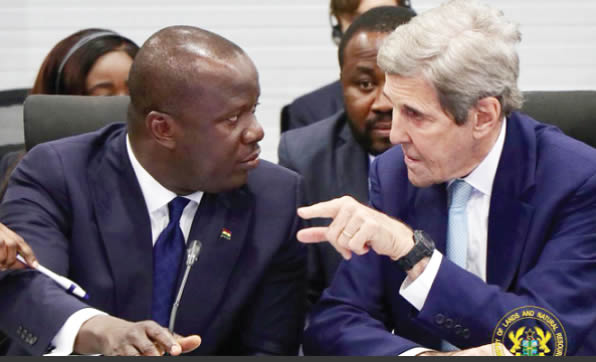
The Minister of Lands and Natural Resources, Samuel Abu Jinapor, last Saturday co-chaired the first ministerial meeting of the Forests and Climate Leaders’ Partnership (FCLP), with a call on developing countries to get their act together to tap into the $20-billion fund the partnership was mobilising to implement nature-based climate actions.
Mr Jinapor, who co-chaired the meeting with the United States’ Special Presidential Envoy for Climate, John Kerry, at the ongoing United Nations Conference on Climate Change (COP27) at Sharm El-Sheikh in Egypt, said the fund was a boost to the climate financing agenda.
Discussions at the meeting, which was attended by 28 ministers and five observer countries, centred on the development of a framework for 2023 and beyond to help achieve the objectives of the partnership.
Among the core objectives of the FCLP is to provide a rallying point for governments and partners to work to implement solutions that reduce forest loss, increase restoration and support sustainable development.
It is also a platform for Heads of State and Government and their ministers to combine their political efforts to accelerate global action to halt and reverse forest loss and land degradation by 2030, while delivering sustainable development and promoting an inclusive rural transformation.
Commitment
In an interview with the Daily Graphic after the ministerial meeting, Mr Jinapor said President Nana Addo Dankwa Akufo-Addo’s chairmanship of the Climate Vulnerable Forum (CVF) and Ghana’s co-chair of the FCLP was an opportunity for the country to mobilise resources and rally support for sustainable climate financing.
“As a respected member of the international community, the government is fully committed to implementing local solutions and supporting the global climate action,” he stressed.
He assured the global community that he would use his leadership of the new partnership to accelerate Ghana’s climate actions and those of other countries.
Ghana’s effort
It has been confirmed that Ghana reduced deforestation by 13 per cent in 2021 and became the third country in the world to be validated and verified by third parties in terms of the country’s Cocoa REDD+ programme that focuses on reducing emissions.
The feat culminated in the country receiving $4.9 million from the Carbon Fund.
At the COP27, the World Bank extended $50 million to Ghana for nature-based climate action.
Mr Jinapor attributed Ghana’s recognition on the global stage to the Green Ghana Project and other interventions in the forestry sector.
He, however, said there was more to be done because the climate crisis was not stopping anytime soon.
“I have meetings with the United States Minister for Climate change, Lord Zac Goldsmith, and we have agreed to engage at the bilateral level for the purposes of collaborating to tackle illegal small-scale mining in Ghana.
“There are other such engagements at the bilateral level, and I can say,without a shred of doubt, that we are getting returns out of our actions and we have to continue to do more,” he said.
Climate financing
Touching on the thorny issue of climate financing, particularly loss and damage, Mr Jinapor said it was important for developed countries to fulfill their pledge of $100 billion annually to developing countries.
He also stressed the need for developing countries to be united in pushing for loss and damage.
“Ghana’s contribution to global greenhouse emissions is just 0.04 per cent, which is so negligible. The contribution of Africa to the global greenhouse gas emissions is also just four per cent, totally insignificant compared with the big emitters in the developed world such as China, the US, the United Kingdom and many others.
“It tells you that the Western world has a moral obligation to pay its quota to clean up the world and keep it cooler,” he said.
Mr Jinapor further explained that the call by President Akufo-Addo for the developed world to get into a debt-swap arrangement with developing countries by cancelling the latter’s debts, so that the money could be used for climate action, was apt and worth exploring further.
“That call has resonated with developing countries and the world at large and it is in that light that we have to continue with the advocacy to ensure that the developed world keep their side of the bargain,” he emphasised.
Background
The FCLP is a voluntary partnership of 26 countries committed to accelerating momentum to halt and reverse forest loss and land degradation by 2030.
It was launched by world leaders, including the EU Commission President Ursula von der Leyen, the UK Prime Minister Rishi Sunak and the leaders of France, Ghana, Congo, Colombia and Germany.
The countries in this partnership account for over 33 per cent of the world’s forests and nearly 60 per of the world’s gross domestic product (GDP).
They will run annual high-level events to build the delivery of and accountability to global forest commitments and provide space for governments to create collective consensus on how to drive progress towards the 2030 target to halt and reverse forest loss and land degradation.
Among other things, the partnership will rally the member countries in key action areas, including international collaboration on sustainable land use economy and supply chains, mobilising public and donor finance to support implementation and shifting the private finance system.
It will also focus on supporting indigenous people and local community initiatives, strengthening and scaling carbon markets for forests, as well as partnerships and incentives for preserving high-integrity forests.
At the launch of the partnership, commitments made by some countries towards halting and reversing forest loss by 2030 were announced.
For instance, Germany committed to doubling its financing of forests from €1 billion to €2 billion through 2025, and an additional $3.6 billion of private capital committed at the COP27.
Source: graphic.com.gh























